Autumn brings out the pumpkin lover in me. Pumpkin is such a versatile vegetable, it’s able to work within both sweet and savory dishes. Truth be told I had never liked canned pumpkin, but finally gathered up my courage to bring home a fresh pumpkin last year. It was an amazing revelation. If you’ve never worked with fresh pumpkin before, I recommend you try it, its not that hard.
Pumpkins are full of beta-carotene, a pigment found in foods that can be converted to Vitamin A. There are also some studies that show that beta-carotene helps with some eye diseases as well. Pumpkins are high in fiber as well magnesium, potassium and zinc. Pumpkin seeds are high in protein and are a good source of essential fatty acids which help with high blood pressure, arthritis as well as healthy skin.
Choosing a Pumpkin
There are pumpkins that are grown for carving and simply looking good and then there are those that are grown for eating. Choosing the right pumpkin makes all the difference. A carving pumpkin has thin walls, are low in sugar and are stringy (the better to scoop out for the carving). Keep in mind that the seeds are edible in any pumpkin variety and are a great snack when roasted. Many of varieties of pumpkin will keep well in a cold area through a large part of the winter. Or you can also cook the pumpkin, puree it and then freeze it as well.
Pumpkins that are good for eating include:
Cooking a Pumpkin
Cooking a pumpkin is fairly easy.
Preheat your oven to 450 degrees.
- Cut the pumpkin open and scoop out the seeds (remember to save these for roasting afterwards). Place the pumpkin halves face down in a baking dish (for easier cleanup, consider lining the baking dish with tin foil). Add ½ inch of water to the pan to help keep the pumpkin moist
- Bake for 45 minutes to an hour until you can pierce the skin with a fork.
- Bring out of the oven, let it cool and then scoop the flesh out of the pumpkin with a fork.
Storing cooked pumpkin is best done by freezing. Take the flesh you want to freeze and puree it in a food processor. Freeze in 1 cup portions.
Cooking with Pumpkin
A lot of recipes out there call for canned pumpkin. Once you’ve pureed your pumpkin you can use it in place of canned for a 1 to 1 basis. A 15oz can of pumpkin will equal 1 ¾ cups of puree, a 29oz can will equal 3 ½ cups pumpkin puree.
Pumpkin Recipes
So now that you have your pumpkin ready, what can you do with it?
One way I use it is to put it in spaghetti sauce. It adds a really nice flavor to the sauce and kids don’t know that you are cramming more vegetables in them.
Other recipes would include:
Soups:
Spiced Pumpkin Soup – Nourishing Meals.com January 2010
Thai Pumpkin Coconut Soup – About.Com Thai Food
Spicy Red Lentil and Pumpkin Soup – Taste.com
Gingered Pumpkin Soup with Gruyere Cheese – About.com
Salads:
Roasted Pumpkin Salad with honey and balsamic dressing – Taste.com
Desserts:
Fresh Pumpkin Pie – AllRecipes.com
To make the pumpkin pie gluten free use this recipe for a gluten free pie crust
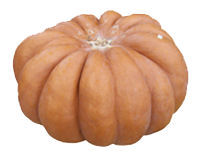
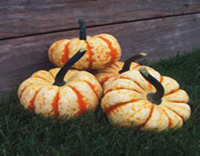
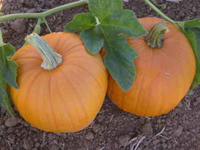
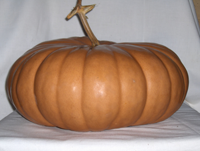
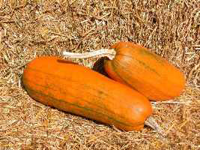
One of my favorite dishes in the fall, that we used to do for circle but it’s unwieldy for larger groups because you can only fit so many in the oven at once, is stuffed pumpkin. We took small pie pumpkins, one for each person, cut off the top and scooped out the seeds. Then we stuffed them full of savory sausage and stuffing, fresh sage leaves, that sort of thing. Then baked them for an hour or so and served a whole one on each plate. Eat it right out to the edge of the skin.
Heaven!
There are tons of stuffed pumpkin recipes online, some people do big ones which might work better for a crowd, I’ve seen a sweet variety done with fruit, all manner of options. I like savory and small best, though.
Hey, I like your blog! It’s really interesting, I’m doing a post on pumpkin’s too, they are an autumnal joy!